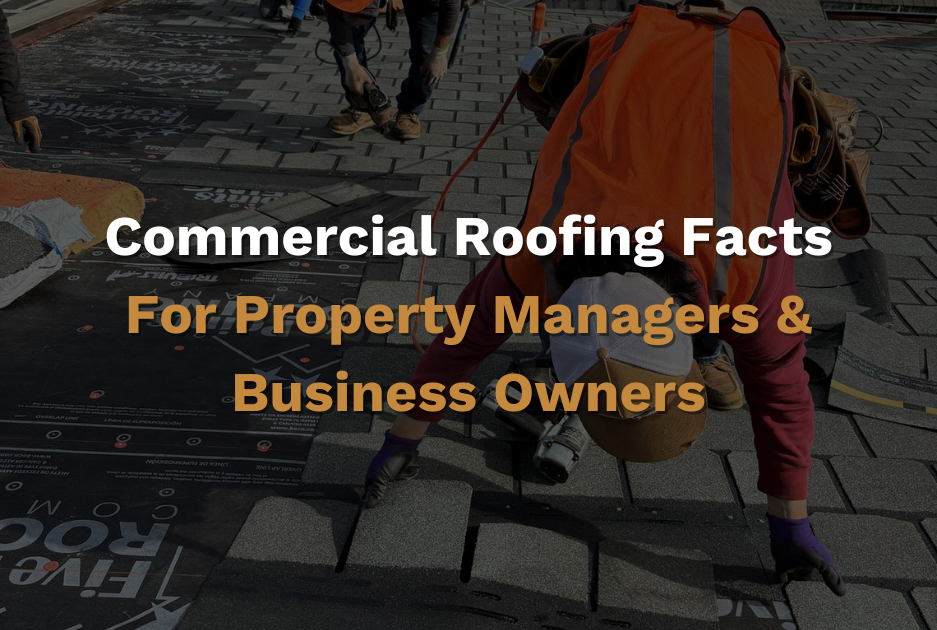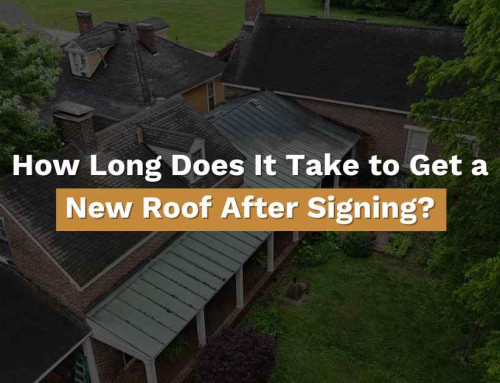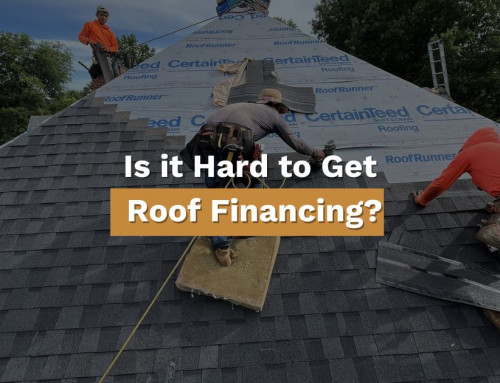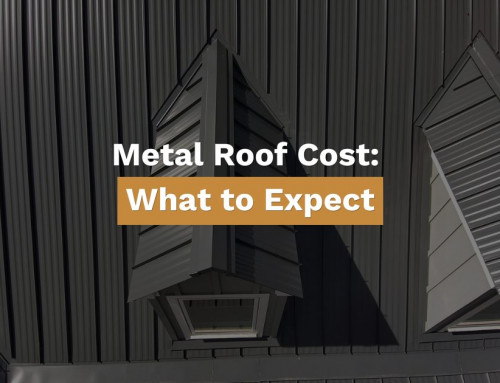
Commercial Roofing Facts in TN
We are here to share with you some commercial roofing facts. When managing a commercial property or running a small business, your roof may not always be at the top of your priority list. However, the roof over your business protects the building, employees, equipment, and inventory inside. It may be easy to overlook, but understanding the essentials of your commercial roof in Franklin, TN, can save you significant time, money, and stress down the road. Whether responsible for an office building, retail space, or industrial facility, staying informed about your commercial roofing needs is critical for maintaining a secure and energy-efficient structure.
At Five Points Roofing, a leading roofing company in Franklin, TN, we combine over 75 years of expertise with a commitment to excellence in customer service. We understand that every commercial roof is unique, so we provide tailored roofing services to meet the needs of businesses throughout Middle Tennessee. Whether you’re looking for roof inspections, repair, or a complete replacement, we’ve got you covered. Here’s what every property manager or business owner should know about commercial roofing and how we can help you keep your business protected.
The Lifespan of Commercial Roofing Materials
Selecting the right roofing materials is one of the most critical decisions regarding your commercial roof. Different materials offer varying levels of durability, maintenance needs, and energy efficiency, making it essential to choose one that suits your building’s requirements and budget.
Here’s an in-depth look at some of the most popular commercial roofing materials:
-
EPDM (Ethylene Propylene Diene Terpolymer): EPDM is a highly durable rubber roofing membrane commonly used on flat roofs. This material is known for its resistance to UV radiation, weathering, and temperature fluctuations. An EPDM roof can last 20-30 years with proper maintenance, making it a reliable option for businesses looking for a low-maintenance solution. Regular roof inspections and maintenance are crucial to extending the lifespan of your EPDM roof.
-
TPO (Thermoplastic Polyolefin): TPO roofing is another popular option for flat roofs, valued for its energy efficiency and UV resistance. TPO membranes are typically white, reflecting sunlight and reducing the building’s heat absorption. This leads to lower cooling costs, especially during the hot and humid summers in Franklin, TN. TPO roofs generally last 15-20 years and require regular roof maintenance, making them a solid choice for businesses investing in energy-saving solutions.
-
Metal Roofing: Metal roofs are an excellent choice for businesses seeking a long-term investment. These roofs are incredibly durable and can last 50 years or more with minimal maintenance. Metal roof installation is particularly popular for commercial properties because of its resistance to fire, wind, and other extreme weather conditions. In addition to their durability, metal roofs offer excellent energy efficiency, reflecting solar radiation and reducing cooling costs. At Five Points Roofing, we specialize in metal roof installation and can help you choose the right type of metal for your building’s unique needs.
-
Built-Up Roofing (BUR): Built-up roofing is a traditional roofing system made from multiple layers of bitumen and fabric, providing excellent protection and durability. BUR systems can last 20-30 years and are known for their ability to handle heavy foot traffic and provide strong waterproofing capabilities. They are often used on flat or low-slope roofs and require regular roof inspections to ensure the layers remain intact and free of damage.
Routine Roof Maintenance: The Key to Longevity
At Five Points Roofing, proactive maintenance is essential to keeping your commercial roof in top condition. Just like any other part of your building, your roof requires regular care to prevent costly problems down the line. Routine roof inspections and repair services help address minor issues before they escalate into major repairs.
We recommend scheduling roof inspections at least twice a year—once in the spring and once in the fall. Additionally, inspections should be conducted after severe weather events, such as storms, hail, or heavy winds. During these inspections, our experienced roofing contractors will assess the condition of your roof and identify any signs of damage or wear. Key areas to inspect include:
-
Cracks or blisters in the roofing membrane
-
Loose or missing flashing around roof edges and penetrations
-
Ponding water or other drainage issues
-
Signs of wear around HVAC units, skylights, or other rooftop equipment
By catching these problems early, you can avoid expensive repairs and extend the lifespan of your roof. Our roofing team provides comprehensive roof maintenance services to help you stay on top of your roofing needs, ensuring your business remains protected year-round.
Roof Leaks: The Silent Threat to Your Business
One of property owners’ most common issues is dealing with a leaky roof. Roof leaks can be particularly deceptive because the visible water damage inside your building may be far from the actual source of the leak. Water can travel along structural components before it becomes noticeable, making it difficult to pinpoint the exact location of the leak without professional help.
At Five Points Roofing, we specialize in identifying and repairing roof leaks. Our roofing contractors use advanced techniques and technology to find the source of the leak, ensuring that the underlying issue is addressed, not just the symptoms. Whether it’s a small leak caused by damaged shingles or a more significant problem stemming from a drainage issue, our team is here to provide reliable roof repair services. Addressing leaks quickly is critical to preventing further damage to your building, equipment, and inventory.
Energy Efficiency and Your Commercial Roof
In today’s environmentally conscious world, energy efficiency is a top priority for many businesses. Your roof plays a significant role in your building’s overall energy performance. Choosing materials with reflective properties, such as metal roofing or TPO, can reduce the heat absorbed by the roof, leading to lower cooling costs.
At Five Points Roofing, we offer a range of roofing solutions that can help improve your building’s energy efficiency. Metal roofs, for example, reflect solar radiation, while TPO roofs are designed to reflect sunlight and heat away from the building. By investing in energy-efficient roofing materials, you not only reduce your utility bills but also contribute to a more sustainable future.
In addition to energy-saving materials, we can apply reflective coatings to existing roofs, further reducing heat absorption and increasing your building’s energy efficiency. These coatings are particularly beneficial for flat roofs and older roofing systems that may not have been designed with energy efficiency in mind.
The Importance of Proper Drainage for Commercial Roofs
Water is one of the biggest threats to the longevity of a commercial roof. Poor drainage can lead to ponding water, which increases the risk of roof leaks, structural damage, and even roof collapse in severe cases. Ensuring your roof has a well-functioning drainage system is critical to its long-term health.
At Five Points Roofing, we take drainage seriously. Whether your building relies on gutters, downspouts, or internal drains, our team will ensure your system is debris-free and functioning properly. Regular roof maintenance should include cleaning and inspecting drainage systems to ensure water flows away from the roof as intended. If your building has experienced drainage issues, our roofing contractors can assess the situation and recommend roof repairs or upgrades to prevent future problems.
Understanding Roof Warranties
Most commercial roofing systems come with a warranty, but it’s essential to know that not all warranties are the same. Understanding your warranty terms can help you avoid inadvertently voiding it and ensure you’re getting the full benefit of your coverage.
At Five Points Roofing, we help our clients understand the specifics of their roof warranties. Many warranties require regular roof inspections and maintenance to remain valid, so keeping detailed records of all roofing services performed is essential. We provide comprehensive documentation of all work done on your roof so you can be confident that you meet your warranty’s requirements.
If you’re unsure about the terms of your warranty, we’re happy to review the details with you and ensure you’re in compliance. Whether you need a minor roof repair or a complete roof replacement, our team will guide you through the process, ensuring that your warranty is protected.
The Impact of Weather on Commercial Roofs in Franklin, TN
The climate in Franklin, TN can be tough on roofs. From hot, humid summers to the occasional winter ice and snow, your roof is constantly exposed to weather conditions that can lead to wear and tear. In addition, severe weather events such as storms and hail can cause significant damage to your commercial roof.
At Five Points Roofing, we understand the unique challenges posed by the Tennessee climate, and we tailor our services to meet the needs of local businesses. Regular roof inspections can help identify problems caused by weather exposure, allowing you to address them before they lead to more severe damage. Whether inspecting for damaged shingles after a storm or checking for ice dams in the winter, our team is here to help ensure your roof is ready for anything.
Roof Replacement: When It’s Time for a New Roof
Even with the best maintenance, all roofs eventually end their lifespan. When it’s time for a roof replacement, it’s important to partner with a trusted roofing contractor like Five Points Roofing to ensure the job is done right. A new roof replacement can be a significant investment, but it protects your business, employees, and assets for decades to come.
Signs that your roof may need to be replaced include:
-
Visible wear and tear, such as damaged shingles, cracks, or blisters
-
Frequent roof leaks or roof repair issues that are no longer cost-effective to fix
-
Roof materials that have reached or exceeded their expected lifespan
-
Structural issues, such as sagging or water damage
When it’s time for a roof replacement, our team at Five Points Roofing team provides a detailed, free estimate outlining the scope of work and material options available to you. We work with various high-quality materials, including metal roofing, asphalt shingles, and TPO, to ensure you have the right roofing system for your commercial property.
Our goal is to make the roof replacement process as smooth and stress-free as possible. We provide clear communication, transparent pricing, and exceptional craftsmanship from the initial inspection to the final installation. As a local roofing company serving the Franklin, TN, community, we take pride in delivering a new roof that protects your business and enhances its overall appearance.
The Role of Insurance in Roof Repairs and Replacements
Dealing with roof damage can be stressful, especially when filing an insurance claim. At Five Points Roofing, we’re here to help you navigate the insurance process and ensure your roof repairs or replacements are covered under your policy.
Whether your roof has been damaged by a storm, hail, or wind, acting quickly is essential. Start by scheduling an initial inspection with our team to assess the damage and provide documentation for your insurance company. We work closely with insurance adjusters to ensure that all damage is properly accounted for and that you receive the maximum coverage for your claim.
Keep in mind that not all damage is covered by insurance. Most policies cover damage caused by sudden events, such as storms, but may not cover wear and tear or roof issues resulting from a lack of maintenance. This is why regular roof maintenance is so critical—it helps prevent issues that could lead to a denied claim.
Our experienced team can guide the entire process for businesses needing assistance with insurance claims, from filing the claim to completing the repairs or roof replacement. We are dedicated to ensuring our clients receive the best possible outcome and the reliable service they deserve.
Emergency Roofing Services for Unexpected Roof Damage
At Five Points Roofing, we understand that roof damage doesn’t always happen during business hours. That’s why we offer emergency roofing services to address urgent roofing issues before they cause further damage to your property.
Whether you’re dealing with a leaky roof, storm damage, or a fallen tree, our roofing team can provide fast, reliable service when needed. We’ll assess the damage, perform temporary repairs if necessary, and work with you to develop a long-term solution. Our priority is ensuring your business remains protected, no matter the situation.
Planning for Future Expansion: How Your Roof Plays a Role
If you’re considering expanding your business in the future—whether by adding more square footage or installing new rooftop equipment like HVAC units—it’s essential to plan how these changes might impact your roof. Some roofing systems are more adaptable than others, and modifying your roof can sometimes require reinforcement or structural changes.
At Five Points Roofing, we can help you assess your current roofing system and determine how it can accommodate future expansions. Whether you’re looking to install new equipment or increase your building’s footprint, our team will work with you to ensure your roof remains strong and reliable.
We also understand the importance of scalability in roofing. Our roofing contractors can recommend solutions that meet your current needs and allow for future growth, ensuring your business is prepared for whatever comes next.
Roof Inspections: A Critical Part of Your Roofing Plan
Routine roof inspections are essential to maintaining the health and longevity of your roof. At Five Points Roofing, we offer comprehensive inspections designed to identify potential issues before they become major problems.
During an inspection, our experienced team will thoroughly assess all aspects of your roof, including the condition of your roofing materials, flashing, drainage systems, and roof penetrations. We also look for signs of wear and tear, such as missing shingles, cracks, leaks, and any structural concerns that could compromise the roof’s integrity.
By scheduling regular roof inspections, you can avoid roofing issues and ensure your roof remains in top condition. We recommend bi-annual inspections—once in the spring and once in the fall—and after any severe weather event. A proactive approach to roof maintenance can save you money in the long run by preventing costly repairs and extending the life of your roof.
Customer Satisfaction and Quality Workmanship: The Five Points Roofing Difference
At Five Points Roofing, we are committed to delivering exceptional service and excellent customer satisfaction to every client we serve. As a local roofing company with deep roots in the Franklin, TN, community, we take pride in our relationships with our clients and the quality of our work.
Our roofing team consists of highly skilled professionals who provide top-notch craftsmanship on every project, whether a minor roof repair or a complete roof installation. We use only the highest-quality materials and adhere to the industry’s best practices, ensuring that your roof is built to last.
We understand that roofing projects can be stressful, so we strive to make the process seamless. From providing free estimates to working closely with your insurance company, we’re here to handle every detail so you can focus on running your business. Our goal is to ensure that every client is completely satisfied with the work we do, and we’re proud of the reputation we’ve built for delivering high-quality roofing solutions.
Conclusion
Your commercial roof is one of the most important investments you’ll make in your business. At Five Points Roofing, we’re here to help you protect that investment with reliable, expert roofing services tailored to your needs. Whether you need a roof inspection, repair, or a new roof replacement, our team has the experience and expertise to get the job done right.
With over 75 years of combined experience in the roofing industry, we’re proud to be a trusted roofing company serving businesses in Franklin, TN, and the surrounding areas, including Spring Hill. Our commitment to customer satisfaction, high-quality materials, and reliable service sets us apart from other roofing companies, and we look forward to working with you on your next roofing project.
If you’re looking for a local roofing company that offers roofing solutions tailored to your needs, contact Five Points Roofing today for a free estimate. Let us help you protect your commercial property and keep your business running smoothly for years.




